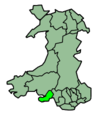Mumbles
Mumbles (Welsh: Mwmbwls) is a headland sited on the western edge of Swansea Bay on the southern coast of Wales. The name Mumbles is also applied to the district encompassing the electoral wards of Oystermouth, Newton, West Cross, and Mayals. In the 2018 Best Places to Live in the UK report, The Sunday Times listed Mumbles as the best in Wales.[1]
Toponym
Mumbles has been noted for its unusual place name.[2] The headland is thought by some to have been named by French sailors, after the shape of the two anthropomorphic islands which comprise the headland: the word "Mumbles" may be a corruption of the French les mamelles, meaning "the breasts." Another possible source of the name is from the word Mamucium which is generally thought to represent a Latinisation of an original Brythonic name, either from mamm- ("breast," in reference to a "breast-like hill") or from mamma ("mother," in reference to a local river goddess).
The Mumbles Lighthouse was built during the 1790s, and was converted to solar powered operation in 1995.[3]
Notable features
The nearby pier was opened in 1898 at the terminus of the Swansea and Mumbles Railway, which was the worlds first public passenger train service, opened 2 Mar 1807, horse power to 1877, then steam power and from 1929 double deck overhead electric tram worked from 1929, closed Jan 1960.[4]
A lifeboat station has operated from Mumbles since 1866. In 1947, the entire lifeboat crew was lost at sea, attempting to rescue the crew of the SS Samtampa, in what has become known as the Mumbles lifeboat disaster. The nearest church, All Saints' Church, Oystermouth, contains memorials to the crew.

The 'Mumbles Mile' is a stretch of road notable for its concentration of pubs. It is a popular destination for students from universities in Swansea and Cardiff for pub crawls and well-known as such in South Wales. Due to a number of pubs closing, it has shrunk over the years.[5]
References
- "The best place to live in the UK in 2018".
- Symons, Mitchell (8 November 2012). The Bumper Book For The Loo: Facts and figures, stats and stories – an unputdownable treat of trivia. Transworld. p. 272. ISBN 978-1-4481-5271-1.
- "Mumbles". Archived from the original on 2013-12-03.
- "The Swansea and Mumbles Railway - the world's first railway service".
- "We did Wales' most famous pub crawl to see what's left of the Mumbles Mile. It's not quite as hard as it used to be!". Wales Online. 18 February 2018. Retrieved 4 November 2019.
